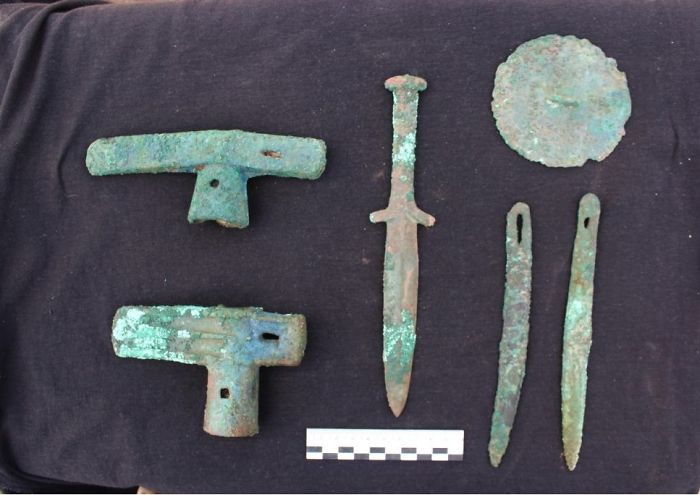2,500-Year-Old Grave Of Ancient Warrior Couple Discovered In Siberia
On an investigation to a 2,500-year-year-old tomb of an ancient warrior and princess was discovered in Siberia. The pair are believed to have died in their 30s and were buried with a baby and an ‘elderly’ servant woman, archaeologists say.
The woman may have been 60 years of age when she died, as she died and was entombed in a crumpled position under the feet of the couple, who may have been spouses.
Remains of the child were scattered throughout the grave, which archaeologists say probably happened when rodents ate the flesh of the deceased.
Experts unearthing the find in southern Siberia say the four people probably succumbed simultaneously to the same infection, and the servant was buried alongside them to look after the family in the afterlife.
The warrior couple, the woman specifically, maybe proof of the lost Scythian civilisation, which inhabited the region of modern-day Russia until 2,200 years ago.

The fighter woman in the grave was buried with the same weaponry as the man, the researchers say, which is unusual. In surviving records and other graves from the same time frame and location, female warriors were buried with a bow and arrows, long-range weapons,
But the woman in the newly unearthed grave was armed with a long-handled weapon, either a hatchet or an axe, and a short sword. These weapons are best suited for hand-to-hand combat and a bloody melee and this difference is indicative of the Scythian culture, researchers say.
Dr Oleg Mitko, head of Archeology at Novosibirsk State University, said: ‘We have an impressive set of weaponry.
‘We found close fight weapons in a female grave, which is not so typical. The woman had a battle-axe.. so she was a part of warrior strata.’
Senior researcher Yuri Teterin said: ‘The man had two axes and two bronze daggers.
‘It is a brilliant burial in that there is an authentic bronze weaponry.’ The man also had a bronze mirror, the researchers say.
Wooden handles of the weapons have no survived millennia in soil, but the metallic elements have. The couple, the baby and servant, are from the Tagar culture, part of the Scythian civilisation, researchers believe.


The older woman had two broken teeth and her possessions were only a broken comb and a small ceramic vessel, indicating she had little personal wealth.
Larger ceramic vessels – believed to have been full of food – were also discovered which were filled with mutton and beef, researchers say.
When they were buried 2,500 years ago, the grave goods and food would have been buried alongside the people because it was believed it helped people in the afterlife.
Scientists say there is no immediate evidence of battle wounds to suggest a cause of death, but further research will be undertaken.
One theory is that they succumbed to an infection at the same time, leading to them all being buried simultaneously. The ancient Greek historian Herodotus left a detailed account of the Scythians and their young women warriors.
But physician Hippocrates added that a young woman would cease her role as a fighter after ‘she takes to herself a husband’.
‘They do not lay aside their virginity until they have killed three of their enemies, and they do not marry before they have performed the traditional sacred rites.’
‘Yet in this case, the woman warrior appears part of a family unit.
Archaeologist Anatoly Vybornov said: ‘Both male and women took part in hostilities. Violence was an acceptable and legal way to solve the problems then.’
